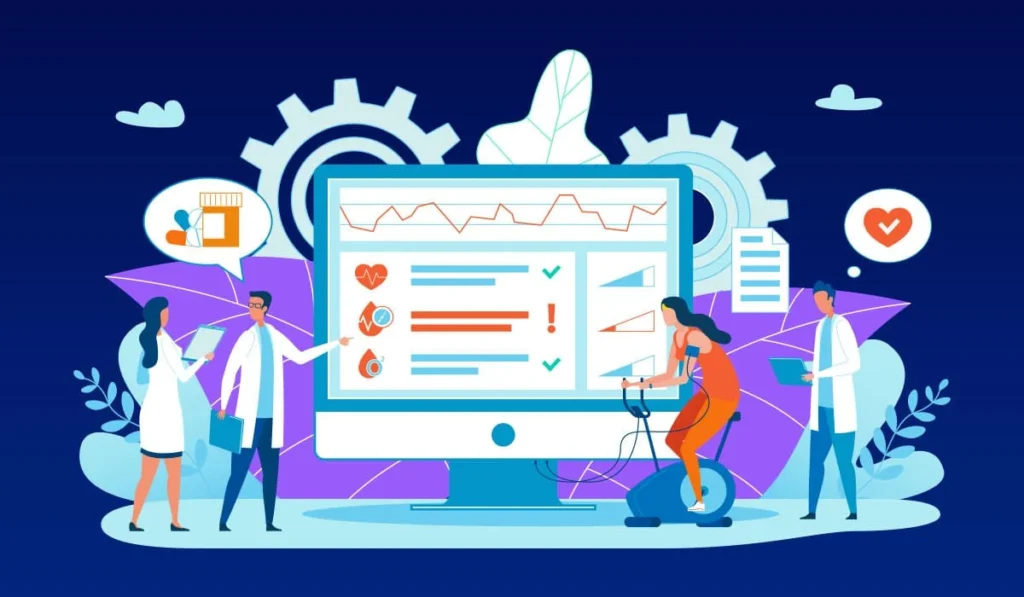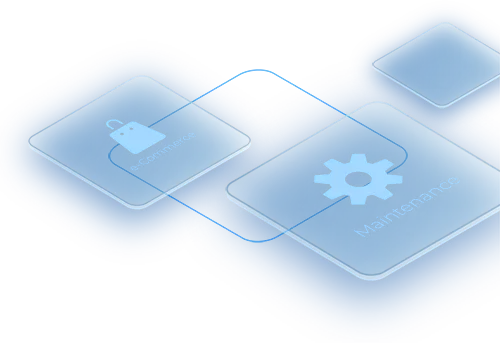
ERP System in Healthcare: Benefits & Components

ERP System in Healthcare: Benefits & Components
Healthcare is a sector that demands precision, efficiency, and adaptability to provide optimal patient care and maintain operational effectiveness.
One technology that has become a game-changer in this field is the Enterprise Resource Planning (ERP) system.
These sophisticated systems integrate and streamline various functions within healthcare organizations.
They offer a comprehensive approach to managing resources, finances, and patient interactions.
In this blog, we will explore the primary benefits of an ERP system in healthcare and discuss why these systems are essential for modern healthcare facilities.
Content Index
- Understanding ERP Systems in Healthcare
- Key Benefits of ERP Systems in Healthcare
- Key Components of ERP Systems for Healthcare
- Conclusion

Understanding ERP Systems in Healthcare
The importance of an ERP system in healthcare cannot be overstated.
It serves as a backbone for modern healthcare operations, enabling seamless coordination and efficiency across various departments.
What is an ERP System?
An Enterprise Resource Planning (ERP) system is an integrated software platform used to manage and automate core business processes.
In healthcare, ERP systems consolidate data and streamline operations across different departments.
This includes patient management, financial management, and supply chain management.
This integration ensures that all critical information is accessible in one place, facilitating better coordination and efficiency.
Why ERP Systems are Essential in Healthcare?
ERP systems are essential in healthcare because they address the complex and multifaceted needs of healthcare organizations.
These systems provide a unified platform that enhances data accuracy, streamlines operations, and improves decision-making processes.
The primary benefits of an ERP system in healthcare include the ability to optimize resources, reduce costs, and ensure compliance with industry regulations.
By centralizing information and automating routine tasks, ERP systems allow healthcare professionals to focus more on patient care rather than administrative duties.
This not only improves the quality of care provided but also increases patient satisfaction.
Key Benefits of ERP Systems in Healthcare
The primary benefits of an ERP system in healthcare are numerous.
These systems streamline operations, manage patient information, and oversee financial processes.
With integration and automation, ERP systems enhance efficiency, accuracy, and patient care, making them vital to modern healthcare.
Streamlined Operations
One of the most significant advantages of an ERP system in healthcare is the streamlining of operations.
Traditional healthcare environments often rely on multiple disparate systems for managing different functions such as patient records, billing, and inventory.
This fragmentation can lead to inefficiencies, errors, and delays.
ERP systems consolidate these functions into a single platform, automating routine tasks and reducing the need for manual intervention.
By integrating various processes, ERP systems eliminate redundancies and streamline workflows.
This leads to faster processing times, reduced administrative burdens, and more efficient use of resources.
For example, appointment scheduling, patient records management, and billing processes are seamlessly connected.
This integration allows for a smoother flow of information and improved coordination among departments.
Improved Data Accuracy
Data accuracy is critical in healthcare, where precise information is essential for effective patient care and operational efficiency.
One of the primary benefits of an ERP system in healthcare is enhanced data accuracy through centralized data management.
When all information is stored and processed within a single system, the risk of data discrepancies and errors is significantly reduced.
ERP systems ensure that patient records, financial data, and inventory information are consistently accurate and up-to-date.
This centralized approach to data management helps reduce errors related to manual data entry.
It also ensures that all departments have access to the same reliable information.
Accurate data is vital for making informed decisions, managing patient care, and maintaining compliance with regulatory standards.
Enhanced Decision-Making
ERP systems provide powerful analytics and reporting tools that greatly enhance decision-making capabilities.
By integrating data from various sources, these systems offer comprehensive insights into healthcare operations.
An ERP system in healthcare can improve the ability to generate detailed reports, track performance metrics, and analyze trends.
These insights enable healthcare organizations to make data-driven decisions that improve operational efficiency, financial performance, and patient outcomes.
For instance, by analyzing patient flow data, healthcare providers can optimize staffing levels and improve resource allocation.
Enhanced decision-making capabilities help in identifying areas for improvement.
They also support implementing strategic changes to meet organizational goals.
Cost Reduction
Cost management is a critical concern for healthcare organizations, and ERP systems play a crucial role in reducing costs.
The primary benefits of an ERP system in healthcare include automation of routine tasks, better resource management, and improved financial oversight.
By streamlining processes and reducing manual intervention, ERP systems help lower operational costs.
For example, automated billing and claims processing reduce administrative overhead and minimize errors that can lead to financial losses.
Improved inventory management ensures that medical supplies are used efficiently, reducing waste and associated costs.
The cost reduction benefits of ERP systems contribute to overall financial stability and sustainability for healthcare organizations.
Regulatory Compliance
Compliance with healthcare regulations is a complex and ongoing challenge for healthcare organizations.
ERP systems offer robust features that help manage compliance, track regulatory requirements, and ensure that all practices meet industry standards.
Using an ERP system in healthcare includes enhanced compliance management and easier adherence to industry standards.
ERP systems provide tools for monitoring compliance, managing documentation, and generating reports required by regulatory bodies.
By maintaining accurate and up-to-date records, healthcare organizations can ensure they meet all regulatory requirements and avoid potential penalties.
Effective compliance management also helps build trust with patients and regulatory authorities.
Improved Patient Care
At the heart of any healthcare organization is the goal of delivering high-quality patient care.
Another primary benefit of an ERP system in healthcare is improvements in patient care through enhanced efficiency and accuracy.
By integrating various functions, ERP systems enable healthcare providers to offer more timely and effective care.
Streamlined access to patient records allows for better coordination among healthcare providers.
This leads to more personalized and efficient treatment plans.
Additionally, improved data accuracy and decision-making capabilities contribute to better patient outcomes and higher levels of patient satisfaction.
The focus on improving patient care is a central benefit of implementing an ERP system in healthcare.
Integration of Services
ERP systems facilitate the seamless integration of various services within a healthcare organization.
Another thing in the usage of an ERP system in healthcare lies in its ability to enhance coordination and communication between departments.
ERP systems connect different functions, such as patient management, financial operations, and supply chain logistics.
This connectivity ensures that all services work together efficiently.
This integration improves overall service delivery and reduces the potential for errors and delays.
Integrated systems provide real-time updates on patient status, inventory levels, and financial transactions.
This ensures that all departments are aligned and working towards common goals.
The seamless integration of services provided by ERP systems contributes to a more cohesive and effective healthcare organization.
Key Components of ERP Systems for Healthcare
In addition to their numerous advantages, ERP systems offer several key components.
These components contribute significantly to the primary benefits of an ERP system in healthcare.
These are crucial for the effective functioning of healthcare organizations.
Patient Management
Patient management is at the heart of any healthcare ERP system.
This component includes functionalities for scheduling, registration, and tracking patient interactions throughout their healthcare journey.
Effective patient management ensures that patient information is accurately recorded, appointments are efficiently managed, and care coordination is streamlined.
It also helps in maintaining a comprehensive patient history, which is vital for delivering personalized care and improving overall patient outcomes.
Financial Management
Financial management within an ERP system for healthcare involves the integration of billing, accounting, and financial reporting.
This component ensures accurate billing for services rendered, manages accounts receivable and payable, and provides financial insights through detailed reporting.
Automating financial processes and integrating them with clinical and administrative data enhances financial accuracy and reduces billing errors.
This integration also improves the overall financial health of healthcare organizations.
Human Resources
The human resources (HR) component of an ERP system is designed to manage the workforce efficiently.
It covers various HR functions such as recruitment, employee records management, payroll, and performance evaluations.
Integrating HR processes with other system components helps healthcare organizations manage staffing needs more effectively.
It also enables better tracking of employee performance and ensures compliance with labor regulations.
This integration ultimately leads to a more productive and satisfied workforce.
Supply Chain Management
Supply chain management is critical for ensuring that healthcare facilities have the necessary resources and materials available when needed.
This ERP component manages inventory, procurement, and logistics, helping to streamline the acquisition and distribution of medical supplies and equipment.
Effective supply chain management reduces waste, prevents stockouts, and optimizes inventory levels.
This is essential for maintaining operational efficiency and providing uninterrupted patient care.
Clinical Management
Clinical management focuses on the integration of various clinical processes and systems within the ERP framework.
This component includes managing electronic health records (EHR), treatment plans, and clinical workflows.
By centralizing clinical data and streamlining processes, healthcare providers can enhance the quality of care and improve patient safety.
This alignment with best practices and regulatory requirements ensures that all clinical activities are effectively managed.
Analytics and Reporting
Analytics and reporting are vital for making informed decisions and improving healthcare delivery.
This ERP component provides tools for analyzing data from various sources, generating reports, and deriving actionable insights.
By using advanced analytics, healthcare organizations can monitor performance and identify trends.
This enables them to make data-driven decisions that enhance operational efficiency and improve patient outcomes.
Compliance and Security
Compliance and security are crucial in the healthcare sector due to the sensitive nature of patient data and stringent regulatory requirements.
The compliance and security component of an ERP system ensures that all data is protected through robust security measures.
It also ensures that the organization adheres to relevant regulations, such as HIPAA.
This component helps safeguard patient information and prevent data breaches.
It also ensures that all operational processes meet legal and regulatory standards.
Conclusion
The primary benefits of an ERP system in healthcare are vast and impactful.
ERP systems play a vital role in modern healthcare facilities by streamlining operations and improving data accuracy.
They also enhance decision-making and support regulatory compliance.
Their integration of services and comprehensive features contribute to better patient care and overall organizational efficiency.
As healthcare continues to evolve, the importance of an ERP system will only grow.
These systems will become an essential investment for any forward-thinking healthcare organization.
Let's Connect!
Are you currently exploring software solutions for your business? 🤔
Great! What’s the single biggest challenge you’d like a software solution to solve for your business? 🎯
💡 Suggested Solution Ideas:
Just one more step! Share your details so our experts can connect with you personally and discuss tailored solutions. 🤝
Thank You for Connecting! 🎉
We've received your information and a specialist will be in touch with you very shortly to discuss how we can help your business thrive.
In the meantime, feel free to browse our resources or reach out if you have immediate questions.
Understood! 🙏
No worries if you're not exploring software solutions right now. Our door is always open if your needs change!
Feel free to explore our other offerings or connect with us anytime.
Featured






